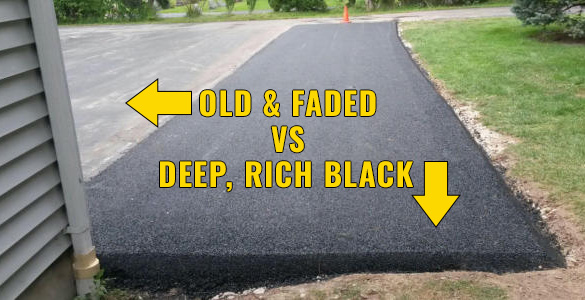Hot Mix Asphalt: A Sustainable Solution for Sidewalk
Warm Mix Asphalt (HMA) has arised as a leading lasting choice for pavement remedies, offering a myriad of ingenious innovations and environmental benefits. As the demand for eco-friendly building and construction practices grows, checking out the subtleties of HMA's sustainability can give valuable understandings into the future of sidewalk solutions.
Environmental Benefits of Hot Mix Asphalt

In Addition, Hot Mix Asphalt aids to mitigate city heat island impacts. Its dark shade soaks up sunshine, reducing the quantity of warmth showed back right into the ambience contrasted to lighter-colored pavements. This can reduce ambient temperatures in urban locations, reducing the demand for air conditioning and ultimately lowering power usage.
In addition, Hot Mix Asphalt adds to improved stormwater monitoring. Its porous nature permits water to charge and penetrate the sidewalk groundwater materials, reducing drainage and the danger of flooding. These ecological benefits make Hot Mix Asphalt a sustainable option for paving freeways and roads.
Energy Effectiveness in HMA Manufacturing
Is power effectiveness an important factor in the manufacturing of Warm Mix Asphalt (HMA)? Definitely. Energy plays a considerable role in the production of HMA, impacting both expense and ecological sustainability. One crucial facet of power effectiveness in HMA manufacturing is making use of cozy mix asphalt (WMA) technologies (angled parking). WMA permits the mixing and placement of asphalt at lower temperatures contrasted to conventional warm mix asphalt, resulting in decreased power intake throughout production. This procedure not only lowers gas use but likewise lowers greenhouse gas exhausts, making it a much more environmentally pleasant alternative.
In addition, advancements in plant innovations have actually led to even more energy-efficient HMA production processes. By maximizing power use in HMA manufacturing, the market can lower its carbon footprint while preserving high-grade sidewalk products.
Recyclability of Warm Mix Asphalt
The recyclability of Hot Mix Asphalt (HMA) is a pivotal facet of its sustainability and long-lasting ecological effect. HMA is among one of the most recycled products in the USA, with over 100 million lots of redeemed asphalt pavement (RAP) being reused every year in brand-new sidewalk building and construction. Recycling HMA offers numerous ecological benefits, such as minimizing the requirement for virgin materials, decreasing power intake during manufacturing, and lowering the quantity of waste sent out to land fills.
The process of recycling HMA entails milling the existing pavement, crushing it right into smaller sized items, and mixing it with brand-new aggregate and asphalt binder to produce a recycled mix. This recycled mix can typically do along with or perhaps much better than traditional HMA, while calling for fewer raw products and generating lower greenhouse gas emissions. By incorporating RAP into new sidewalk tasks, road firms can preserve all-natural sources, lower expenses, and reduce the environmental impact of road building and maintenance activities. In general, the recyclability Look At This of HMA plays a substantial role in promoting sustainable techniques within the sidewalk sector.

Long-Term Performance of HMA
Asphalt sidewalks show durability and durability over an extensive duration, showing the long-term performance of Hot Mix Asphalt (HMA) Additionally, developments in HMA innovation, such as the use of polymer-modified binders and cozy mix asphalt, have better boosted the toughness and durability of HMA sidewalks. By prioritizing high quality building and construction and maintenance practices, HMA proceeds to verify itself as a affordable and sustainable service for resilient sidewalk infrastructure.

HMA: Durability and Sustainability
Demonstrating both resilience and sustainability, Hot Mix Asphalt (HMA) has actually ended up being a keystone in the construction of resilient sidewalk frameworks - regrading. HMA's sturdiness comes from its capacity to endure hefty loads, extreme weather, and high web traffic volumes, making it a reliable selection for highways, freeways, and flight terminal runways. The make-up of HMA, which generally includes accumulations, binder, and filler, plays a critical duty in improving its longevity and resistance to deterioration
Furthermore, HMA's sustainability lies in its recyclability and energy-efficient manufacturing process. The capability to reuse redeemed asphalt pavement (RAP) in new HMA combinations reduces the need for virgin materials and lessens the environmental effect of pavement building and maintenance. Additionally, the energy performance of creating HMA depends on its lower blending temperatures compared to other pavement materials, causing minimized energy usage and greenhouse gas discharges.
Conclusion
Finally, hot mix asphalt (HMA) provides a sustainable solution for sidewalk with its environmentally pleasant directory characteristics. HMA's recyclability, energy performance in production, and long-lasting toughness make it an environment-friendly selection for road construction. By conserving all-natural resources, lowering waste, and reducing greenhouse gas discharges, HMA plays a vital duty in promoting sustainability in facilities advancement. Its capacity to reduce urban warmth island results better emphasizes its value in developing resilient and ecologically conscious pavement systems.
HMA is one of the most recycled materials in the United States, with over 100 million lots of recovered asphalt pavement (RAP) being recycled every year in brand-new sidewalk building and construction.The process of reusing HMA involves milling the existing sidewalk, squashing it right into smaller pieces, and mixing it with new aggregate and asphalt binder to produce a recycled mix.Asphalt sidewalks show sturdiness and durability discover this info here over an extensive period, mirroring the long-term efficiency of Warm Mix Asphalt (HMA) In addition, advancements in HMA innovation, such as the use of polymer-modified binders and cozy mix asphalt, have further boosted the toughness and long life of HMA pavements. The capability to recycle redeemed asphalt pavement (RAP) in new HMA blends minimizes the need for virgin products and decreases the environmental impact of sidewalk building and maintenance.
Comments on “Change Your Home's Aesthetics: Commercial Car Park Leading and Asphalt Sealing Solutions”